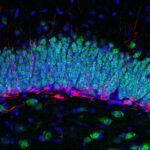Link to DOI – 10.1101/2021.02.24.432612
bioRxiv 2021.02.24.432612
Episodic memory formation and recall are complementary processes that put conflicting requirements on neuronal computations in the hippocampus. How this challenge is resolved in hippocampal circuits is unclear. To address this question, we obtained in vivo whole-cell patch-clamp recordings from dentate gyrus granule cells in head-fixed mice navigating in familiar and novel virtual environments. We find that granule cells consistently show a small transient depolarization of their membrane potential upon transition to a novel environment. This synaptic novelty signal is sensitive to local application of atropine, indicating that it depends on metabotropic acetylcholine receptors. A computational model suggests that the observed transient synaptic response to novel environments may lead to a bias in the granule cell population activity, which can in turn drive the downstream attractor networks to a new state, thereby favoring the switch from generalization to discrimination when faced with novelty. Such a novelty-driven cholinergic switch may enable flexible encoding of new memories while preserving stable retrieval of familiar ones.


